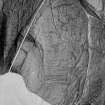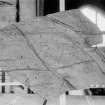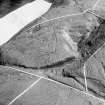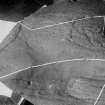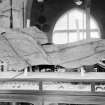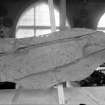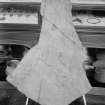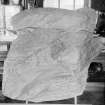Pricing Change
New pricing for orders of material from this site will come into place shortly. Charges for supply of digital images, digitisation on demand, prints and licensing will be altered.
Traprain Law
Cross Incised Rock (Early Medieval), Cup And Ring Marked Rock (Prehistoric), Rock Carving(S) (Period Unassigned)
Site Name Traprain Law
Classification Cross Incised Rock (Early Medieval), Cup And Ring Marked Rock (Prehistoric), Rock Carving(S) (Period Unassigned)
Canmore ID 56487
Site Number NT57SE 88
NGR NT 583 748
Datum OSGB36 - NGR
Permalink http://canmore.org.uk/site/56487
- Council East Lothian
- Parish Prestonkirk
- Former Region Lothian
- Former District East Lothian
- Former County East Lothian
NT57SE 88 c. 583 748.
Four carved rock surfaces were found on the NE slope of Traprain Law (NT57SE 1.00), 2ft below turf level, prior to quarrying. All carved within about 13 sq m were at least 7 cups-and-rings, with up to 7 concentric rings, many straight and other grooves, many crossing in grid or herring-bone patterns, a cross, and other indeterminate designs. They are now quarried away, but parts and casts are in Royal Museum of Scotland (RMS), formerly the National Museum of Antiquities of Scotland (NMAS) (GV (1932) 97-98 and GV (1967) 289-294).
Glasgow Herald, 29 September 1931; Proc Soc Antiq Scot 1932; 1969; A J H Edwards 1935; R W B Morris 1969; 1981.
Publication Account (2005)
One of the most unexpected results of the 2004 fieldwork on Traprain Law was the discovery of in situ rock carvings on the floor of a putatively Iron Age building on the southern edge of the summit. This was not the first rock art to be found at Traprain. During the 1930s, several large panels had been discovered during quarrying on the NE side of the hill [NT57SE 88]. Although Arthur Edwards from the National Museums of Scotland was able to records the carvings and take casts, the rock art itself was mercilessly blown up to allow quarrying to proceed. The casts and original fragments, preserved in the NMS stores, had been the subject of re-evaluation by the present authors prior to the present discoveries. They are a an extraordinary collection; a suite of complex cup-and-ring markings in the conventional Atlantic European style, overlain by a unique set of linear motifs seemingly related to the to the decorative styles present in the Cordoned Urn pottery tradition.
The new panel [NT57SE 183] corresponds to the earlier phase of carving, and consists of at least five cup-and-ring marks, three of which are conjoined. There are also faint traces of small rosettes, possible chevrons and at least one lozenge, suggesting similarities to passage grave art.
It is rare for in situ rock art to be discovered stratigraphically sealed in an archaeological excavation. Although partly covered by the metalled floor of the later building, the most complex cup-and-ring motifs in the panel would have been 'on display' within the floor of the later building, close by the hearth. Although it is tempting to see this as a deliberate act of incorporation of the earlier art within the new building, the exposed motifs were very faint and the re-use of this outcrop may have been fortuitous.
[Illustrations include interpretative plan of revealed rock art].
I Armit and M McCartney 2005
Artefact Recovery (2014)
NT 584 750 A fragment of the rock art from the N side of Traprain Law, destroyed by quarrying in the 1930s, was found in the quarry. It preserves a series of transverse grooves.
Claimed as Treasure Trove (TT 168/13), allocated to National Museums Scotland
Fraser Hunter – National Museums Scotland
(Source: DES)



















